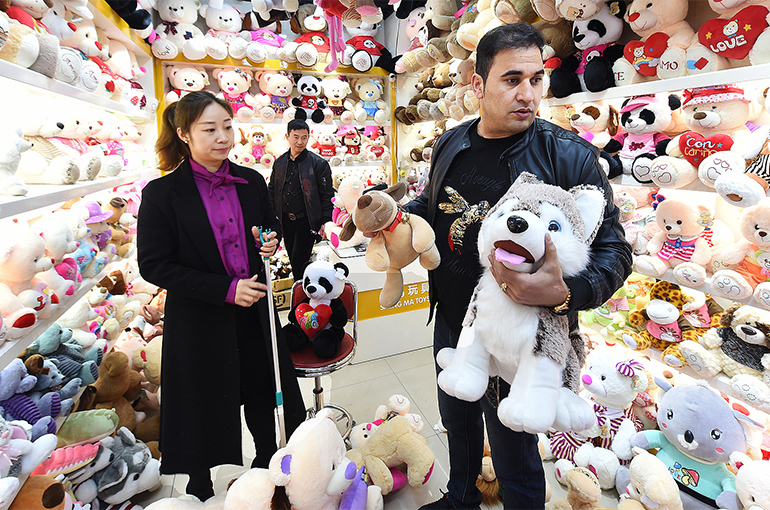 More Small Commodity Merchants in Yiwu Land on Cross-Border E-Commerce Sites
More Small Commodity Merchants in Yiwu Land on Cross-Border E-Commerce Sites(Yicai) May 17 -- More and more merchants in Yiwu, a Chinese city known as the world’s largest small commodities factory, have started opening their own shops on cross-border e-commerce platforms to expand their businesses.
The number of new merchants from Yiwu on Alibaba.Com surged nearly 78 percent in the past month and a half from a year earlier, according to data from the cross-border business-to-business e-commerce site of Alibaba Group Holding.
“On this one-kilometer street, there are at least 10 merchants I know who are already doing cross-border e-commerce business,” Chen Jinbao, founder of artificial flower maker Doufu, told Yicai.
Compared with traditional exporters who usually deal with large bulk orders, those using cross-border e-commerce platforms usually receive scattered orders, Chen said. But this is not a problem for Doufu because Chen has vast experience with domestic e-commerce platforms, so he knows how to arrange his supply chain to satisfy online clients.
Doufu’s complete supply chain across China centered in Yiwu is the company’s biggest resource to be successful on cross-border e-commerce platforms, Chen noted.
Chen opened Doufu in 2021 and immediately began selling products on cross-border e-commerce platforms. Last year, the firm achieved overseas sales of CNY20 million (USD2.8 million) through cross-border e-commerce, up about 30 percent from the previous year, according to Chen. Meanwhile, Doufu earned CNY100 million (USD13.9 million) from the domestic market.
Feng Junfeng decided to give up the traditional agent-procurement mode in 2017, as its whole foreign trade business is now done through cross-border e-commerce platforms, the Chinese hair ornament merchant based in Yiwu told Yicai.
Feng picked environment-friendly degradable hair accessories and ornaments as his main products after carrying out market research with the help of big data services provided by e-commerce platforms.
Feng’s annual revenue from exports exceeded CNY40 million, as environment-friendly products are becoming more and more popular abroad, especially in Europe and the United States, which led to significant increases in sales in each of the past several years.
Compared to conventional foreign trade models, cross-border e-commerce business has higher profit margins and is risk-free for sellers because they receive the money before delivering the order, Feng noted.
Newcomers to cross-border e-commerce from Yiwu are busy improving their supply chains while trying to raise awareness of their brands overseas to better meet demand from foreign clients.
After becoming a cross-border e-commerce seller, Feng started building new plants to increase production capacity. To ensure supply, he is also expanding partnerships along the supply chain all the way to upstream raw material suppliers and hiking its marketing and brand-building efforts to promote its products overseas.
Chen also started upgrading Doufu’s supply chain capabilities. Most producers in the artificial flower industry operate like legacy workshops that require manual work, so it is hard to form large-scale production, Chen said. Therefore, he decided not to rely only on his factory but opened its business to partnerships. Douyu has now over 100 partners from four Chinese provincial-level regions in northern and southern China.
Editors: Tang Shihua, Futura Costaglione